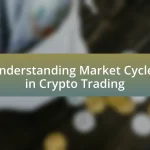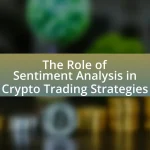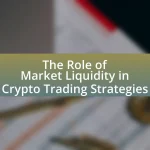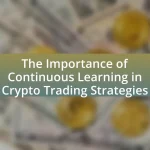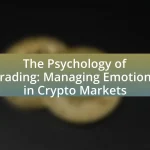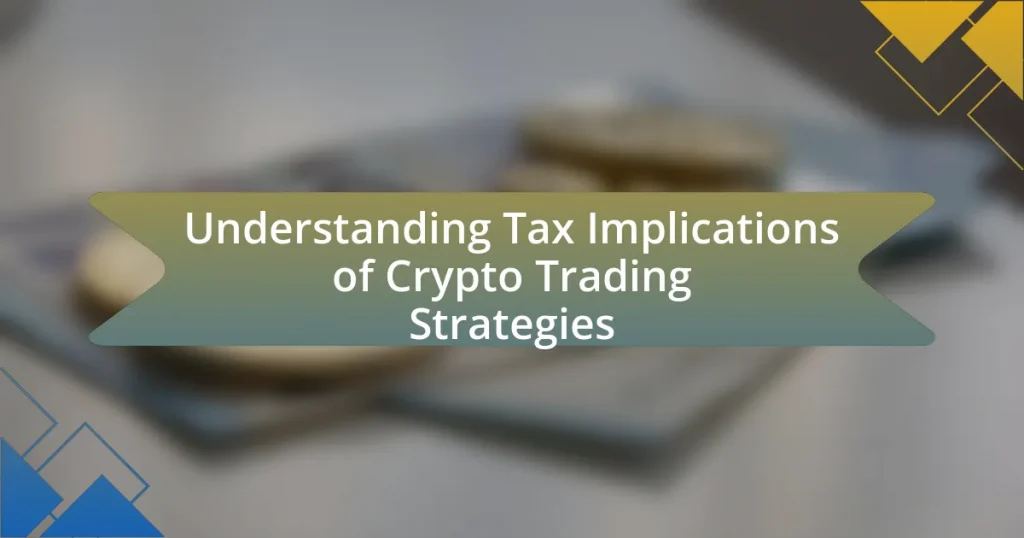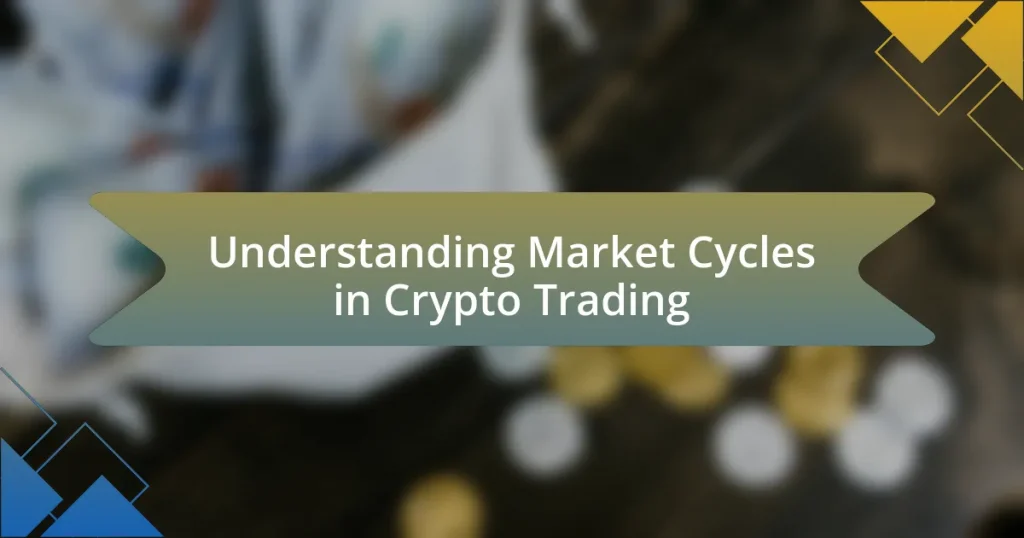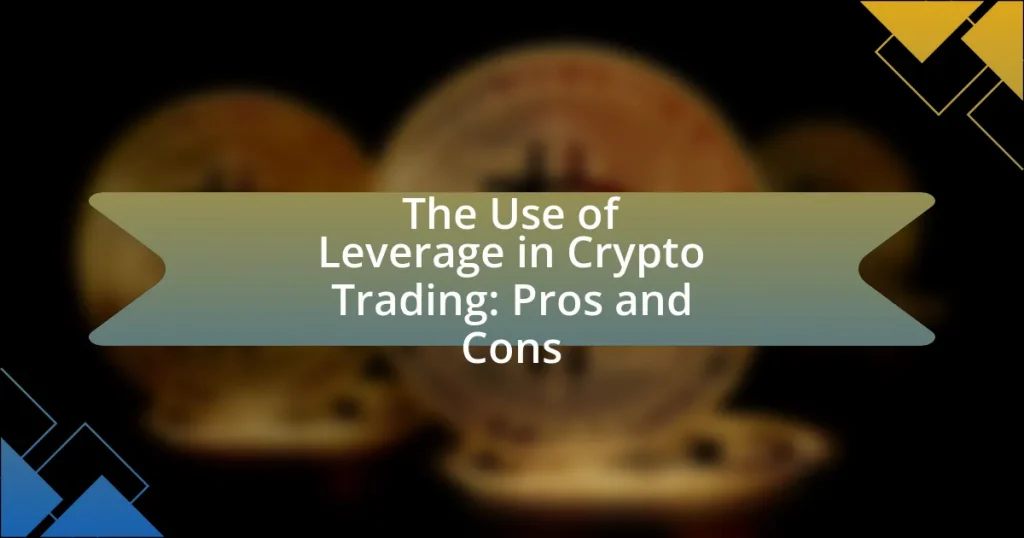The article examines how market news influences crypto trading decisions, highlighting the significant impact of news on trader sentiment and market volatility. It discusses various types of market news, including regulatory announcements, technological advancements, and macroeconomic factors, and their effects on trading behavior. The article also explores the psychological aspects of trading, such as emotional responses to news and common biases that affect decision-making. Additionally, it emphasizes the importance of timely information, analytical tools, and strategies for traders to effectively integrate news into their trading practices while managing risks and emotions.

How does market news impact crypto trading decisions?
Market news significantly impacts crypto trading decisions by influencing trader sentiment and market volatility. For instance, positive news such as regulatory approval or institutional investment can lead to increased buying activity, driving prices up. Conversely, negative news, like security breaches or unfavorable regulations, often results in panic selling, causing prices to drop. Historical data shows that major announcements, such as the launch of Bitcoin futures in 2017, led to substantial price fluctuations, highlighting the direct correlation between news events and trading behavior.
What types of market news influence crypto trading?
Market news that influences crypto trading includes regulatory announcements, technological advancements, market sentiment indicators, and macroeconomic factors. Regulatory announcements, such as government policies or legal rulings regarding cryptocurrencies, can significantly impact market confidence and trading volumes. For instance, the announcement of stricter regulations in a major economy often leads to price declines, while favorable regulations can boost prices. Technological advancements, such as upgrades to blockchain protocols or the introduction of new cryptocurrencies, can also sway investor interest and trading activity. Market sentiment indicators, including social media trends and investor sentiment surveys, provide insights into public perception and can lead to rapid price fluctuations. Lastly, macroeconomic factors, such as inflation rates and economic stability, influence investor behavior in the crypto market, as seen during economic downturns when investors may seek alternative assets like cryptocurrencies.
How do economic indicators affect crypto prices?
Economic indicators significantly influence crypto prices by affecting investor sentiment and market dynamics. For instance, when economic indicators such as inflation rates or unemployment figures signal a weakening economy, investors may seek alternative assets like cryptocurrencies, driving up their prices. Conversely, positive economic indicators, such as strong GDP growth, can lead to a decrease in crypto prices as investors may prefer traditional assets. Historical data shows that during the COVID-19 pandemic, the announcement of stimulus packages led to a surge in Bitcoin prices, illustrating how economic policies directly impact crypto valuations.
What role do regulatory announcements play in trading decisions?
Regulatory announcements significantly influence trading decisions by impacting market sentiment and investor behavior. When regulatory bodies announce new rules or guidelines, traders often react quickly, adjusting their positions based on perceived risks or opportunities. For instance, the announcement of stricter regulations on cryptocurrency exchanges can lead to a decline in trading volumes and prices, as seen in the aftermath of the U.S. Securities and Exchange Commission’s actions in 2018, which caused a notable drop in Bitcoin’s value. Conversely, positive regulatory news, such as the approval of a Bitcoin ETF, can lead to increased market confidence and higher trading activity. Thus, regulatory announcements serve as critical indicators that shape trading strategies and market dynamics.
Why is timely information crucial for crypto traders?
Timely information is crucial for crypto traders because it enables them to make informed decisions that can significantly impact their trading outcomes. In the highly volatile cryptocurrency market, prices can fluctuate rapidly based on news events, regulatory changes, or market sentiment. For instance, a report from CoinMarketCap indicates that major announcements can lead to price movements of over 10% within minutes. Therefore, having access to real-time information allows traders to react quickly to market changes, capitalize on opportunities, and mitigate potential losses.
How does the speed of news dissemination affect trading outcomes?
The speed of news dissemination significantly impacts trading outcomes by influencing market reactions and price volatility. Rapid news delivery allows traders to react quickly to information, leading to immediate price adjustments in assets. For instance, a study by Baruch Lev and Anup Srivastava in the Journal of Accounting Research found that timely news can lead to more efficient price discovery, as traders incorporate new information into their decision-making processes almost instantaneously. Consequently, faster dissemination can result in increased trading volume and heightened volatility, as traders rush to capitalize on perceived opportunities or mitigate risks based on the latest information.
What are the consequences of delayed reactions to market news?
Delayed reactions to market news can lead to significant financial losses for traders. When traders fail to respond promptly to new information, they may miss optimal entry or exit points, resulting in diminished profits or increased losses. For instance, a study by the CFA Institute found that timely reactions to market news can enhance returns by up to 20% compared to delayed responses. Additionally, delayed reactions can exacerbate market volatility, as a sudden influx of trades in response to previously unaddressed news can lead to sharp price swings. This phenomenon was evident during the 2020 market crash, where delayed responses to economic indicators contributed to heightened volatility and uncertainty in asset prices.
How do traders interpret market news for decision-making?
Traders interpret market news by analyzing its potential impact on asset prices and market sentiment. They assess the relevance of news, such as economic indicators, regulatory changes, or technological advancements, to gauge how these factors may influence supply and demand dynamics. For instance, a positive regulatory announcement can lead to increased investor confidence, resulting in price surges, while negative news may trigger sell-offs. Historical data shows that significant market events, like the announcement of Bitcoin futures trading in 2017, led to substantial price fluctuations, illustrating how traders react to news. By employing technical analysis and sentiment analysis tools, traders can quantify the effects of news on market trends, enabling informed decision-making.
What analytical tools do traders use to assess news impact?
Traders use various analytical tools to assess news impact, including sentiment analysis, economic calendars, and news aggregators. Sentiment analysis tools evaluate the tone of news articles and social media posts to gauge market sentiment, which can influence trading decisions. Economic calendars provide scheduled economic events and their expected impacts, helping traders anticipate market movements based on news releases. News aggregators compile news from multiple sources, allowing traders to quickly access relevant information and react promptly to market changes. These tools collectively enable traders to make informed decisions based on the latest news developments.
How do sentiment analysis and social media influence trading strategies?
Sentiment analysis and social media significantly influence trading strategies by providing real-time insights into market sentiment and public perception. Traders utilize sentiment analysis tools to gauge the emotional tone of social media posts, news articles, and other online content related to cryptocurrencies, which can indicate potential price movements. For instance, a study by Bollen et al. (2011) demonstrated that Twitter sentiment could predict stock market movements, highlighting the correlation between social media sentiment and trading behavior. Additionally, platforms like Reddit and Twitter have become pivotal in shaping trader sentiment, as viral posts can lead to rapid price fluctuations, evidenced by the GameStop trading phenomenon in early 2021. Thus, traders who effectively analyze sentiment from social media can make informed decisions, enhancing their trading strategies.

What are the psychological effects of market news on traders?
Market news significantly impacts traders’ psychology, often leading to emotional responses such as fear, greed, and anxiety. These emotions can drive impulsive trading decisions, resulting in increased volatility in the market. For instance, a positive news report about a cryptocurrency can create a sense of euphoria among traders, prompting them to buy aggressively, while negative news can trigger panic selling. Research by the University of California, Berkeley, indicates that traders often exhibit herd behavior, where they follow the actions of others rather than relying on their analysis, further amplifying market movements. This psychological influence underscores the importance of understanding market news as a critical factor in trading behavior.
How does market news create emotional responses in traders?
Market news creates emotional responses in traders primarily through the impact of information on perceived market conditions. When traders receive news, such as regulatory announcements or significant price movements, it can trigger feelings of fear, greed, or excitement, influencing their trading decisions. For instance, a positive news report about a cryptocurrency’s adoption can lead to increased optimism, prompting traders to buy, while negative news can incite panic selling. Research indicates that emotional responses to market news can lead to irrational trading behaviors, as evidenced by a study published in the Journal of Behavioral Finance, which found that traders often overreact to news, resulting in price volatility.
What are the common psychological biases that affect trading decisions?
Common psychological biases that affect trading decisions include overconfidence, loss aversion, and herd behavior. Overconfidence leads traders to overestimate their knowledge and predictive abilities, often resulting in excessive risk-taking. Loss aversion causes individuals to prefer avoiding losses over acquiring equivalent gains, which can lead to holding losing positions too long. Herd behavior occurs when traders follow the actions of others, often ignoring their own analysis, which can amplify market trends and volatility. These biases are well-documented in behavioral finance literature, illustrating their significant impact on trading outcomes.
How can traders manage their emotions in response to market news?
Traders can manage their emotions in response to market news by implementing structured trading plans and utilizing emotional regulation techniques. A structured trading plan includes predefined entry and exit points, risk management strategies, and clear criteria for decision-making, which helps reduce impulsive reactions to market fluctuations. Emotional regulation techniques, such as mindfulness and cognitive reframing, allow traders to maintain a balanced perspective, enabling them to assess news objectively rather than reactively. Research indicates that traders who employ these strategies experience lower levels of stress and improved decision-making, as evidenced by studies showing that emotional discipline correlates with better trading performance.
Why do traders often react irrationally to market news?
Traders often react irrationally to market news due to cognitive biases and emotional responses that cloud their judgment. These biases, such as overconfidence and herd behavior, lead traders to make impulsive decisions rather than rational ones. For instance, during significant market events, traders may experience fear of missing out (FOMO) or panic selling, which can result in drastic price fluctuations. Research by the Behavioral Finance Association highlights that emotional reactions can lead to suboptimal trading strategies, as traders prioritize immediate emotional responses over analytical assessments.
What role does fear and greed play in trading behavior?
Fear and greed significantly influence trading behavior by driving market sentiment and decision-making. Traders often experience fear during market downturns, leading to panic selling, which can exacerbate price declines. Conversely, greed tends to dominate during bullish trends, prompting traders to buy aggressively, sometimes resulting in overvaluation and market bubbles. Research by the Behavioral Finance Association indicates that emotional responses, particularly fear and greed, can lead to irrational trading decisions, causing deviations from fundamental asset values. This emotional impact is evident in the volatility of cryptocurrency markets, where rapid price changes often trigger fear-based sell-offs or greed-driven buying frenzies.
How can understanding psychological factors improve trading outcomes?
Understanding psychological factors can significantly improve trading outcomes by enabling traders to manage emotions, make rational decisions, and avoid common cognitive biases. For instance, recognizing the impact of fear and greed can help traders stick to their strategies during volatile market conditions, reducing the likelihood of impulsive decisions that lead to losses. Research indicates that traders who are aware of their psychological tendencies are better equipped to implement disciplined trading plans, which can enhance performance. A study published in the Journal of Behavioral Finance found that emotional regulation positively correlates with trading success, demonstrating that psychological awareness directly influences trading effectiveness.
What strategies can traders use to mitigate the impact of news on their decisions?
Traders can mitigate the impact of news on their decisions by employing strategies such as developing a robust risk management plan, utilizing technical analysis, and maintaining a diversified portfolio. A robust risk management plan helps traders set stop-loss orders and position sizes that limit potential losses during volatile news events. Technical analysis allows traders to focus on price trends and patterns rather than emotional reactions to news, enabling them to make more informed decisions. Additionally, maintaining a diversified portfolio reduces the risk associated with any single news event affecting a specific asset, as losses in one area may be offset by gains in another. These strategies are supported by the fact that traders who implement risk management techniques often experience lower drawdowns during market volatility, as evidenced by studies showing that disciplined trading approaches lead to better long-term performance.
How can developing a trading plan help in managing news-related stress?
Developing a trading plan helps manage news-related stress by providing a structured approach to decision-making during volatile market conditions. A well-defined trading plan outlines specific strategies, risk management techniques, and entry and exit points, which reduces uncertainty when reacting to news events. For instance, traders who adhere to a plan are less likely to make impulsive decisions based on emotional reactions to news, as they have predetermined criteria for their trades. Research indicates that traders with a clear plan experience lower anxiety levels, as they can rely on their established guidelines rather than succumbing to the pressure of real-time news. This structured approach ultimately leads to more disciplined trading behavior and improved overall performance.
What are the benefits of using automated trading systems in response to news?
Automated trading systems provide several benefits in response to news, primarily through speed, accuracy, and emotionless trading. These systems can analyze vast amounts of news data and execute trades within milliseconds, capitalizing on market movements before human traders can react. For instance, a study by the Journal of Financial Markets found that algorithmic trading can improve execution prices by up to 20% during high-volatility events, such as major news releases. Additionally, automated systems eliminate emotional biases that can lead to poor trading decisions, ensuring that trades are based solely on data-driven strategies. This combination of rapid response and objective decision-making enhances trading efficiency and profitability in the volatile crypto market.

How can traders stay informed about market news effectively?
Traders can stay informed about market news effectively by utilizing a combination of real-time news platforms, social media, and financial news aggregators. Real-time news platforms like Bloomberg and Reuters provide up-to-the-minute updates on market developments, which are crucial for making timely trading decisions. Social media platforms, particularly Twitter, allow traders to follow industry experts and analysts who share insights and breaking news, enhancing their understanding of market sentiment. Financial news aggregators like Feedly compile articles from various sources, enabling traders to access a wide range of perspectives in one place. According to a study by the CFA Institute, timely access to market news significantly improves trading performance, highlighting the importance of staying informed.
What sources of market news are most reliable for crypto traders?
The most reliable sources of market news for crypto traders include established financial news websites, specialized cryptocurrency news platforms, and social media channels with verified information. Websites like CoinDesk and CoinTelegraph provide timely updates and in-depth analysis, while Bloomberg and Reuters offer broader financial context. According to a 2021 survey by the CFA Institute, 70% of financial professionals rely on reputable news outlets for market insights, underscoring the importance of credible sources in making informed trading decisions. Additionally, social media platforms like Twitter can be valuable when following industry experts and influencers who share real-time updates and insights.
How can traders differentiate between credible news and misinformation?
Traders can differentiate between credible news and misinformation by verifying the source of the information and cross-referencing it with multiple reputable outlets. Credible news typically comes from established financial news organizations, government publications, or verified industry experts, while misinformation often originates from unverified social media accounts or anonymous sources. For instance, a study by the Pew Research Center found that 64% of Americans believe that misinformation is a significant problem, highlighting the importance of source verification. Additionally, traders should look for corroborating evidence, such as data from market analysis or official statements, to confirm the accuracy of the news before making trading decisions.
What role do news aggregators play in keeping traders informed?
News aggregators play a crucial role in keeping traders informed by consolidating and delivering real-time updates from various sources in one accessible platform. This aggregation allows traders to quickly access relevant market news, analysis, and trends, which are essential for making informed trading decisions. For instance, a study by the CFA Institute highlights that timely access to news can significantly impact trading performance, as traders who utilize news aggregators are often better positioned to react to market changes. By providing a streamlined flow of information, news aggregators enhance traders’ ability to stay updated on critical developments that influence market dynamics.
How can traders utilize alerts and notifications for market news?
Traders can utilize alerts and notifications for market news by setting up real-time updates on price movements, economic indicators, and significant events that impact the cryptocurrency market. These alerts enable traders to respond quickly to market changes, enhancing their decision-making process. For instance, a trader might configure alerts for specific price thresholds or news releases from reputable financial sources, allowing them to capitalize on market volatility. Research indicates that timely information can lead to more informed trading decisions, as traders who act on alerts are often able to secure better entry and exit points, ultimately improving their profitability.
What tools are available for setting up news alerts?
Google Alerts, Feedly, and Talkwalker Alerts are effective tools for setting up news alerts. Google Alerts allows users to receive notifications based on specific keywords, providing real-time updates on relevant news articles and blog posts. Feedly aggregates content from various sources, enabling users to follow specific topics and receive alerts when new content is published. Talkwalker Alerts offers similar functionality, allowing users to monitor mentions of keywords across news sites, blogs, and social media. These tools are widely used for staying informed about market news that influences crypto trading decisions.
How can traders prioritize news based on their trading strategies?
Traders can prioritize news based on their trading strategies by assessing the relevance and impact of news events on their specific market positions. For instance, fundamental traders may focus on economic indicators and regulatory announcements that directly affect asset valuations, while technical traders might prioritize news that influences market sentiment or volatility. Historical data shows that significant news events, such as regulatory changes or major technological advancements, can lead to price fluctuations; for example, the announcement of Bitcoin futures trading in 2017 resulted in a substantial price increase. By aligning news prioritization with their trading strategies, traders can make informed decisions that enhance their market responsiveness and potential profitability.
What best practices should traders follow to integrate news into their trading strategies?
Traders should prioritize timely analysis of news events to effectively integrate them into their trading strategies. This involves monitoring credible news sources and economic calendars to stay informed about market-moving events, such as regulatory announcements or technological advancements in the crypto space. For instance, a study by the Journal of Financial Economics found that significant news events can lead to price volatility, emphasizing the need for traders to react quickly to relevant information. Additionally, traders should develop a systematic approach to assess the potential impact of news on their positions, utilizing tools like sentiment analysis and historical data to gauge market reactions. By combining real-time news analysis with established trading strategies, traders can enhance their decision-making process and potentially improve their trading outcomes.
How can traders balance news analysis with technical analysis?
Traders can balance news analysis with technical analysis by integrating both approaches to form a comprehensive trading strategy. This involves using technical indicators to identify market trends and entry or exit points while simultaneously staying informed about relevant news events that could impact market sentiment. For instance, a trader might observe a bullish trend indicated by moving averages but also monitor news releases that could affect the asset’s price, such as regulatory announcements or major partnerships. By doing so, traders can make more informed decisions, reducing the risk of being caught off guard by sudden market movements triggered by news events. Historical data shows that markets often react sharply to news, underscoring the importance of incorporating both analyses for effective trading.
What are the common pitfalls to avoid when reacting to market news?
Common pitfalls to avoid when reacting to market news include making impulsive decisions, overreacting to headlines, and neglecting to verify information. Impulsive decisions often lead to buying or selling assets without proper analysis, which can result in significant losses. Overreacting to headlines can cause traders to act on sensationalized news rather than the underlying facts, leading to poor investment choices. Additionally, neglecting to verify information can result in trading based on rumors or false reports, which is particularly risky in the volatile crypto market. For instance, a study by the CFA Institute found that emotional trading can lead to a 20% decrease in portfolio performance, highlighting the importance of a measured response to market news.

